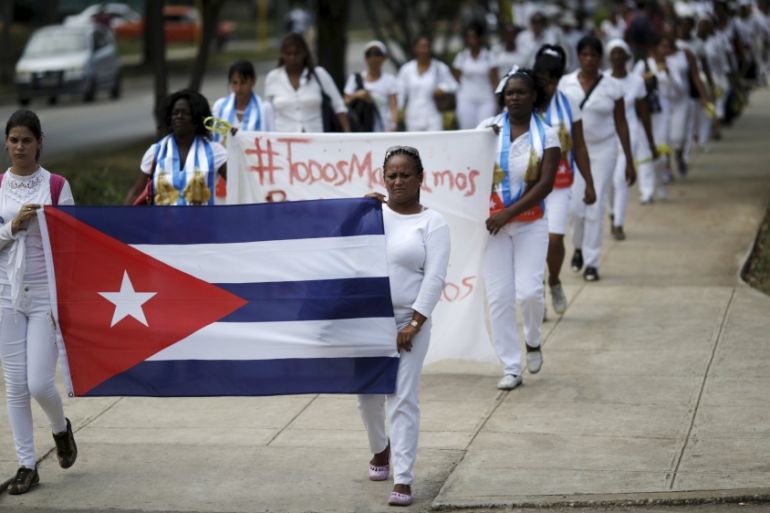US-Cuba rapprochement and the future
The pace and timing of rapprochement has already prompted concerns about a superficial transition.

In the Chinese neighbourhood of Havana, a contemporary art exhibition reflects upon the comparative benefits of the Chinese system. The message is clear – socialist politics and society; capitalist economy. In a system where political dissent and scrutiny of the revolution are strictly curtailed, this permitted narrative tells much about the Cuban elite’s preferred future orientation.
As the rapprochement between Cuba and the United States catalyses the next phase of economic liberalisation, so calls for political change will intensify. The regime’s ability to stifle such demands by exploiting the process for its own ends may, however, threatens the normalisation of relations between Cuba and the US.
Keep reading
list of 4 items‘We share with rats’: Neglect, empty promises for S African hostel-dwellers
Thirty years waiting for a house: South Africa’s ‘backyard’ dwellers
Photos: Malnutrition threatens future Afghan generations
How the transition is handled will determine whether or not Cuba becomes a vibrant, pluralistic democracy or a Chinese replica on the US’s doorstep.
‘Special Period and Recovery’
Cuba has experience of reacting to the need for reform created by regional and geopolitical developments, most notably during the “Special Period” that followed the collapse of the Soviet Union.
The demise of Venezuela’s Bolivarian revolution and the subsidised oil Cuba long-benefited from under Hugo Chavez – whose picture still adorns billboards across Cuba – is just one of a series of external shocks that the island has endeavoured to absorb.
The necessity of securing subsidies and hard foreign currency in a rapidly changing world has always shaped Cuba’s foreign and economic policies. Cuba’s recent economic adjustment – which has accelerated since Raul Castro assumed the presidency from his brother, Fidel, in 2008 – gave small-scale entrepreneurs the opportunity to prosper from tourism. The regime’s longevity is testament, in part, to such flexibility and adaptability in the face of adversity.
Sharpening the distinction between capitalist economy, and one-party socialist politics and society proposes a compromise to the Cuban polity - embrace new opportunities for entrepreneurship in return for silence on political reform.
The thaw in relations with the US has refocused attention on Cuba’s entrepreneurial spirit and the ability of an expanding middle class to drive broader reform.
Trade and travel restrictions are being rapidly eased – with direct commercial flights being reintroduced and permission to travel expanded – and the US Embassy in Havana has reopened after 54 years.
The prevailing wisdom is that the energy unleashed will underpin irresistible demands for democratic change, especially when complemented by Cubans in exile across the Florida Straits in Miami who have waited patiently for such an opening.
Limitations on free speech, expression and assembly in Cuba, along with human rights and democracy, have been well-documented.
A United Nations Human Rights Day protest last December led to the some 100 activists being arrested for disturbing public order, including many from Ladies in White – a group of women protesting against the imprisonment of their jailed dissident relatives.
Cuban artists such as “El Sexto” and Tania Bruguera have both been held by Cuban police within the past year.
Neither the president nor prime minister is elected by popular vote. Access to information remains heavily curtailed, with the internet exorbitantly expensive – one hour’s access costing roughly $4 in a country where the average monthly salary is $25 and which is widely censored.
A true Chinese model?
While years of blockade have created an appetite for an end to shortages on supermarket shelves, the revolution’s resilience should not be underestimated.
The country is littered with billboards declaring the revolution’s achievements, especially where healthcare and education are concerned, while children’s cartoons still portray Cuba’s liberation from colonial powers, namely the Spanish.
OPINION: A new era of relations between Washington and Havana
So-called Committees for the Defence of the Revolution, which report on counter-revolutionary activity, operate across Cuba.
Underpinned by 58 years of propaganda, plus continued state control of education and the media, the revolution’s ideals and narrative are still revered by many, especially the older generations who recall the pre-revolutionary era.
The embrace of the Chinese model – and indeed the strengthening of ties, with China now one of Cuba’s most important trading partners – by the incumbent regime is designed to deter questions about political change.
OPINION: The US in Cuba – a history of organised crime
Sharpening the distinction between capitalist economy, and one-party socialist politics and society proposes a compromise to the Cuban polity – embrace new opportunities for entrepreneurship in return for silence on political reform.
Spiking inequalities – the “winners” and “losers” dynamic of transition – which tear at the very heart of Cuba’s post-revolution social contract are ignored by a state-controlled media.
Historical narratives about imperialism and the blockade’s impact continue to be deployed, including to fend-off compensation claims pertaining to property confiscated during the revolution.

The pace and timing of rapprochement – motivated in part by the US President Barack Obama’s dwindling mandate and considerations of his legacy – has already prompted concerns about a superficial transition.
Economic liberalisation alone will not be the political change demanded by proponents of ending the blockade. Slow progress in securing fundamental freedoms for the Cuban people, however, may prompt a renunciation of Obama’s courageous moves by his successor.
Treading a fine and patient line between economic and political change is now imperative. With a mishandled or stalled transition, the Chinese model will quickly take hold, and Cubans may very soon become nostalgic for the revolution and what might have been.
Ian Bancroft is a writer based in the Balkans. He is the co-founder of TransConflict, a UK-registered charity undertaking conflict transformation projects and research.
The views expressed in this article are the author’s own and do not necessarily reflect Al Jazeera’s editorial policy.
